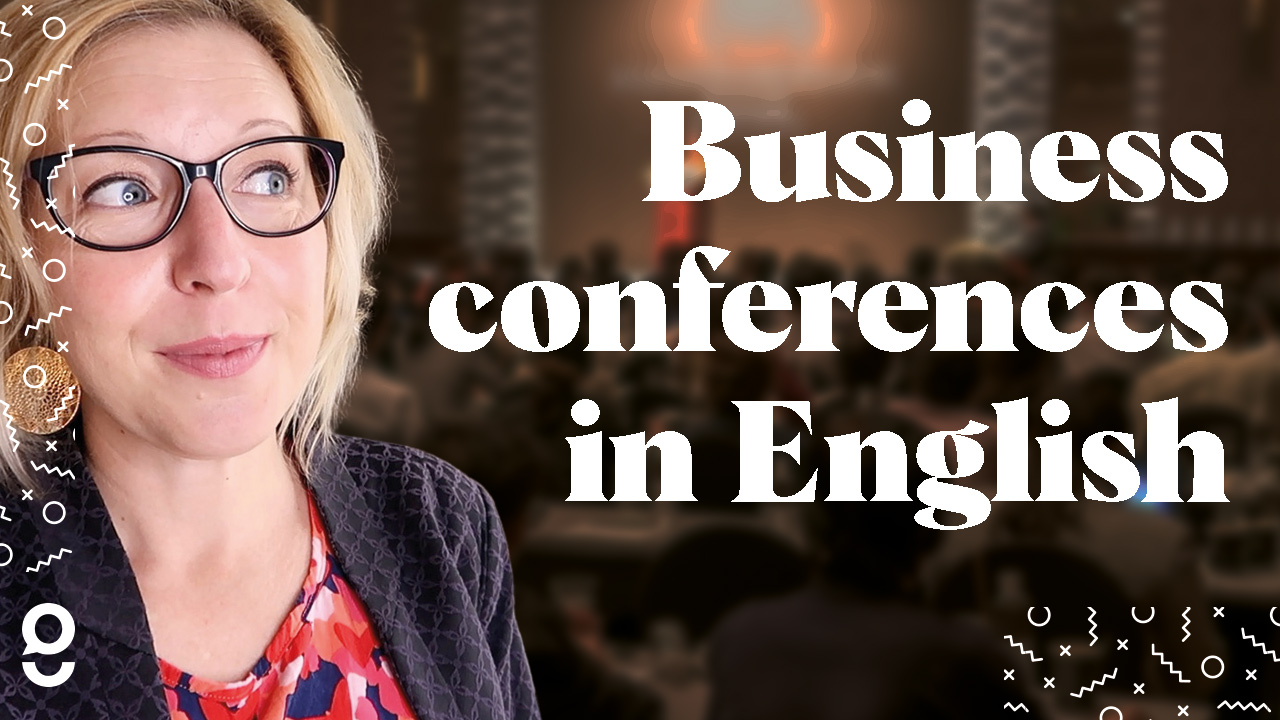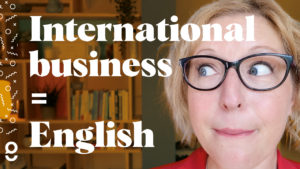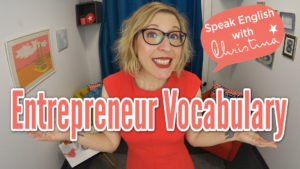
Imagine it. That exciting international conference is coming. The conference that can help you take your business and make it international. Where you could meet an important new client or contact. But…you’re thinking of not even going. Because you’re worried that your Business English isn’t good enough. Let’s make sure you have the courage to go to that conference and meet your next client.
If you want to have more business and more international business, conferences are a big opportunity. BUT, maybe attending a conference in English sounds stressful?
Today you’ll learn how you can prepare for a business conference in English, build your confidence and grow your business.
If you’re an entrepreneur you need these emails!
I asked 30,000 entrepreneurs about the emails they need NOW to grow their businesses. Then I wrote those emails in English. Get my 8 must-have emails for your business here.
Are you an entrepreneur who needs English for your business?
Then there’s something I know about you: you need the best possible English learning strategies right now. You need this English Habits Starter Kit I created just for entrepreneurs and business owners.
What you’ll learn in this article:
1. Tips to prepare for your next conference: Learn a Simple Elevator Pitch.
2. Tips to prepare for your next conference: Confidence=Great Conferences.
3. Tips to prepare for your next conference: Research people and know what to say!
4. Tips to prepare for your next conference: Don’t forget to follow up!
5. QUIZ YOURSELF ON TODAY’S LESSON
1. Tips to prepare for your next conference: Learn a Simple Elevator Pitch.
Ok, if you’re attending a conference, you’re going to introduce yourself and explain what you do. And one thing that’s kind of interesting about being an entrepreneur is that, well, we do some really new and unique things! So explaining what we do can be an art!
Today we’ll focus on one short, simple and unusual way to introduce yourself when you’re an entrepreneur. Let’s try something a little different. Start with the problem you solve.
Here’s an example: If someone asks me at a conference:
“What brings you to the Consumer Electronics Show?”
I might answer like this (starting with the problem):
“Well, you know when you’re starting a new and unique business? And you realize it’s time to get international clients BUT, you realize that doing that in English sounds really hard and scary?”
The other person will be shaking their head and may even say, “Oh, yeah, I know what you mean.”
Then I would say:
“Well, I help those entrepreneurs find smart ways to get the English they need to grow their business.”
Ready to try? Start with the problem.
Maybe your company sells Apps that help people organize their projects. You could say…
“Well, you know when a team or business has a complex project to organize and you have to keep track of different deadlines? I create Apps that help companies plan and track those projects and finish them on time.”
And there you have one simple and slightly different way to introduce yourself at a conference.
There is a LOT to say about your elevator pitch and introducing yourself. If you’re serious about being better at introducing yourself and promoting your business be sure to sign up for my newsletter so that you get my future lessons on the topic and invitation to my future live events!
2. Tips to prepare for your next conference: Confidence=Great Conferences.
You’re an entrepreneur, so you probably already know that confidence means being better at business. In fact, there is a lot of research in confidence and business–and confidence in English. In fact, here are two tips from me as an entrepreneur and a neurolanguage coach:
Confidence is a skill you can practice.
Don’t wait to be confident to start practicing!!
As a coach, my job is also to help you pick one thing you can practice becoming confident in now. So you don’t have to wait to get results.
In fact, I have one client who struggled with her confidence and she actually realized that what was really hard for her was those first 5 minutes of conversation where you say basic things. But where you have to improvise.
If the small talk at conferences is a problem for you, start by learning a few expressions you can use and practice them until you feel confident using them. For example, you could learn a couple of questions to use to start conversations like:
“What brings you to the conference?”
Or
“Did you see that Amy Porterfield is going to be presenting on growing your network?”
If you’re like the client I mentioned before and you realize that your real problem is that you’re not very good at improvising even with “simple” introductions.
Well, it’s because it’s not simple at all and to improve you need to be able to practice introducing yourself more than once–with a real person! Or better yet, with lots of real people.
If you’ve got a few weeks before your conference, try finding a friend or colleague to practice role-playing introductions with.
Or join a conversation club like my Faster Fluency Conversation Club–where you introduce yourself to other professionals again and again. That’s what worked for the client I mentioned before–now she loves meeting new people and introducing herself.
Since I make video lessons, I sometimes meet people in business who already know about me. They know I come from Mississippi and started my own business in France! Even that I’m an entrepreneur who works with other entrepreneurs.
When someone knows about you, you automatically feel like you should know something about them too. And you naturally want to find out more about them.
You can do the same kind of research about people you hope to meet. Even if they don’t have a YouTube channel!
You can learn more about someone you hope to meet at a conference by checking out their professional blog, LinkedIn profile or press releases.
So what do you say to them in English when you meet them? Try one of these:
You could mention news about their company:
“I saw you just launched a new product, how did that go?”
Some people share about their business (or personal travel) on LinkedIn. Then you could say:
“I saw that you recently traveled to Latin America–that must have been fascinating.”
Maybe the person just moved to a new position in their company. You could say:
“I heard that you’re now head of communications–how are you enjoying your new role?”
Or maybe the person recently posted on a topic they’re just passionate about. Try saying something like this:
“I read your post on LinkedIn about climate change in your city–it really resonated with me…”
3. Tips to prepare for your next conference: Research people and know what to say!
When you’re at a conference or meeting a new business contact, have you ever noticed that it’s easier to make a connection when you already know something about them?
I asked 30,000 entrepreneurs about the emails they need NOW to grow their businesses. Then I wrote those emails in English. Get my 8 must-have emails for your business here.
If you’re an entrepreneur doing business in English your time is precious. Use strategies that work to help you learn English fast when you get the English Habits Starter Kit I created just for entrepreneurs and business owners.
4. Tips to prepare for your next conference: Don’t forget to follow up!
Ok, so if you go to a conference, you’re going to meet some great new people. Afterward, you’ve got to follow up! And that means…writing a few emails. I know, I know, when you’re an entrepreneur working outside your native language ‘just writing a few emails’ can feel really difficult–and a little intimidating. But you have to do this for your business…
And I know you can send those follow up emails in English. Because I created a pack of must-have emails in English just for entrepreneurs like you–that you can download, change and use to do business in English right now. So if you’re planning to go to a conference, get your 8 Must-Have Emails in English today.
5. Take the next step for your English and your Business:
QUIZ YOURSELF ON TODAY’S LESSON
#1. This elevator pitch is out of order. Can you reorganize it so it makes sense?
has to work up the courage to start an entirely new project and meet new people through networking?
I run training programs for entrepreneurs in the UK
Well, you know when an entrepreneur
that help them find the courage to take on new projects and connect with the right people.
#2. And now…can you fill in the blank for your own ‘start with the problem’ pitch?
Well you know when ______[insert the problem you solve here]_____________?
I help _________[insert who you help here]_________
so they can _____________[insert the goal or outcome here].
Improve your English in the comments:
The best way to become more confident using Business English is to practice!
Here’s your Confidence Challenge for this week:
- Tell me about a memorable conference you attended in the past? What was it about?
- Share your story in the comments below.
Further reading for entrepreneurs in English
Curious to learn more about the topic of the day? I’ve selected this excellent resource for you. It helps native speakers find confidence and take on their next conference! And it will help you too.
– From Psychology Today: Business: Confidence Matters in the Corporate World
– From INC.com: Attending Conferences: 5 Tips for Tackling Big Events
Are You an Entrepreneur Who Needs English for Your Business? Then you need these emails!
We asked our community of entrepreneurs about the emails they need to send NOW to grow their businesses. These are the emails they need to make new contacts, and turn them into clients…or maybe just get paid for the work you did!
We also asked our entrepreneurs what business emails were the hardest to write.
Then, we created 8 perfect email models so that you can write an email that is effective and polite–fast. Because you need email to start a conversation with your international clients.
And because you shouldn’t have to spend an hour writing an email in English–and then wondering if you said that right.
Get “8 Must-Have Emails for Entrepreneurs–in English.”
…and write emails that can change your business today.
More good stuff…
Click the image to learn more








ANSWERS to TODAY’S QUIZ:
#1. Here’s that elevator pitch in order:
Well, you know when an entrepreneur has to work up the courage to start an entirely new project and meet new people through networking?
I run training programs for entrepreneurs in the UK that help them find the courage to take on new projects and connect with the right people.
#2. Your elevator pitch? Well, that depends on you!